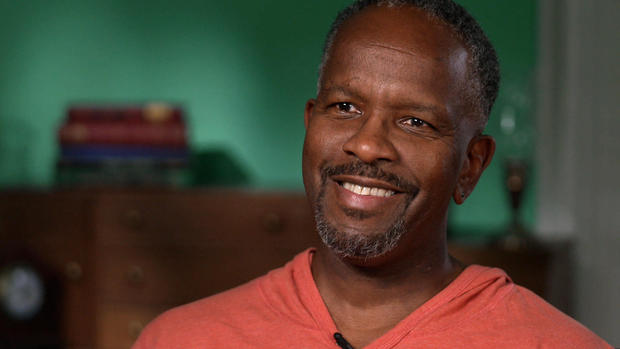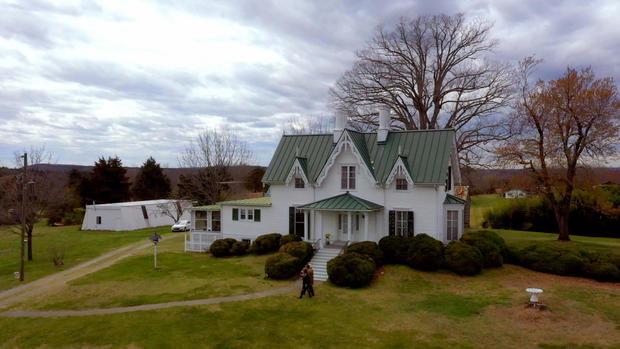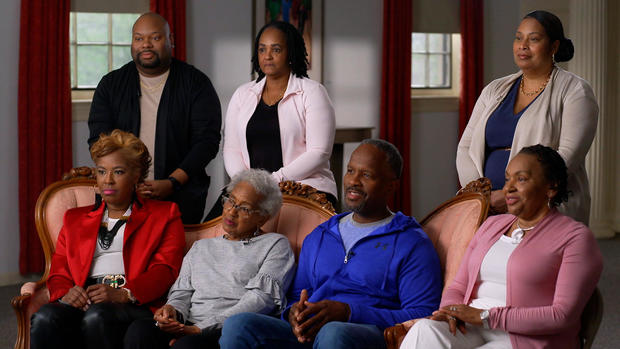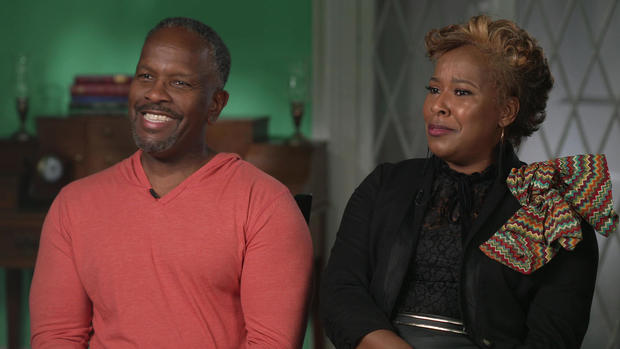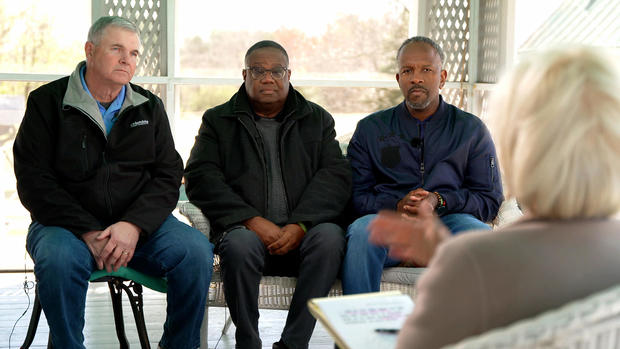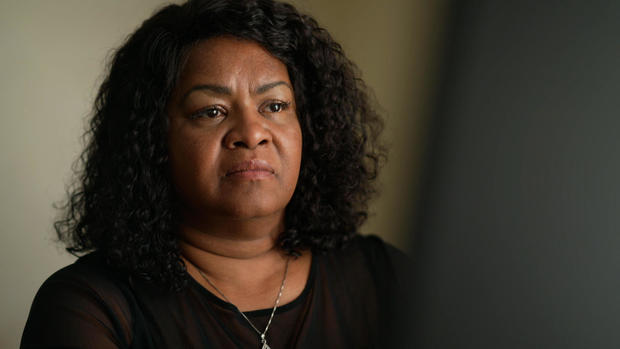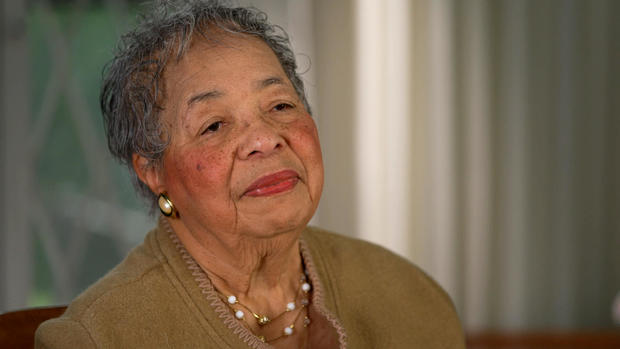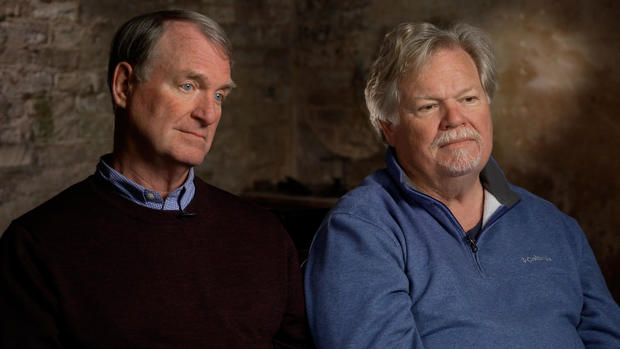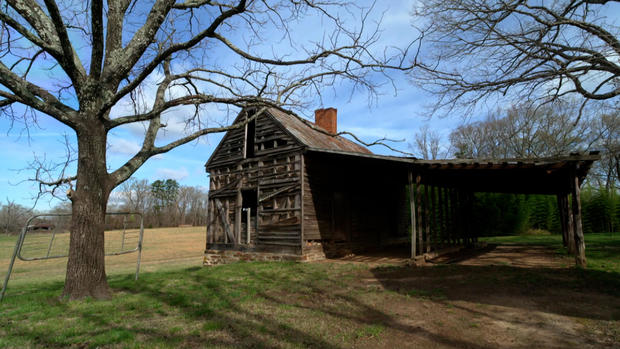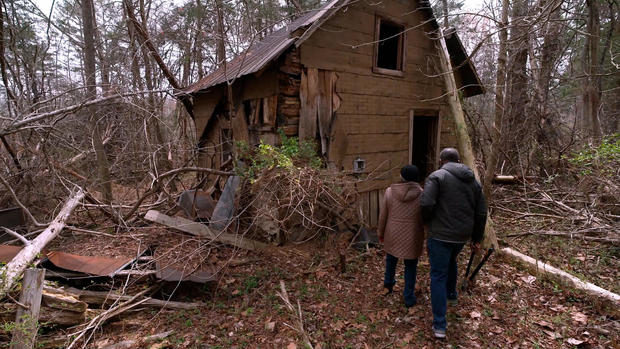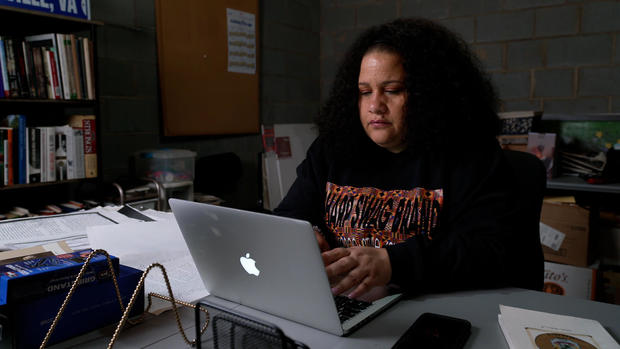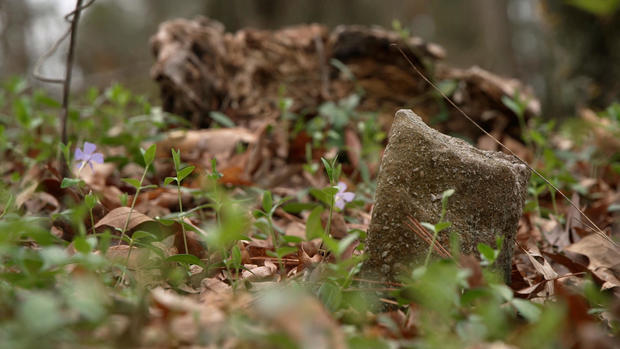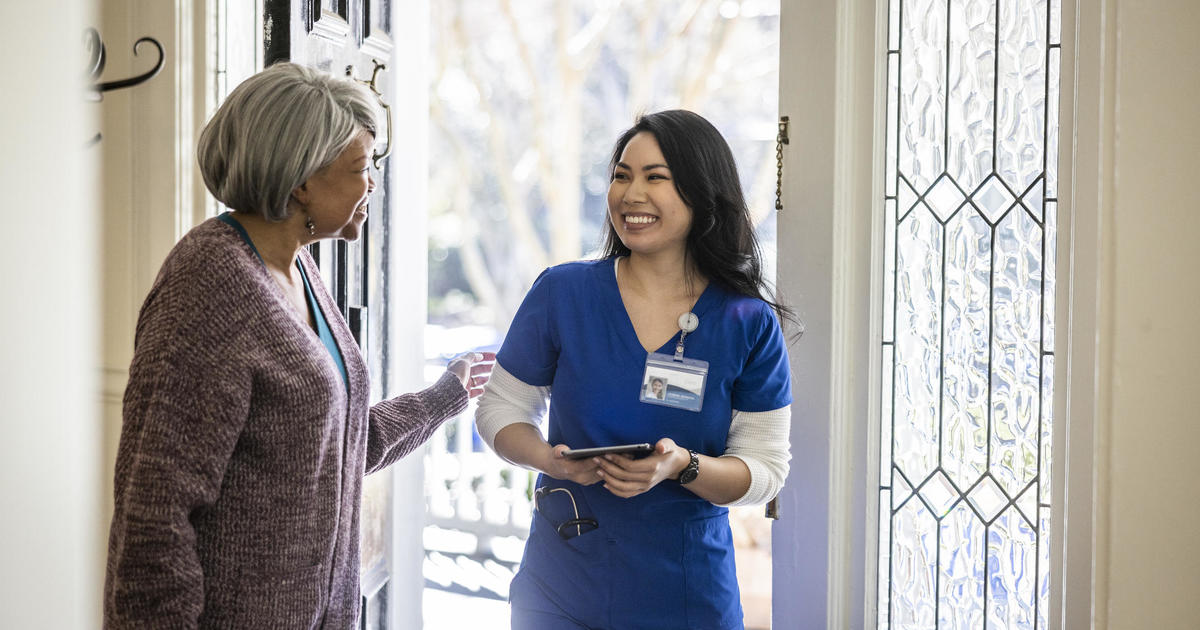How an Air Force veteran discovered his new house was the seat of a plantation where his ancestors were enslaved
Producer's note: As a 60 Minutes producer, sometimes you read about a story that you just have to pursue. That was the case for me when I read Joe Heim's story in the Washington Post about the Miller family in southern Virginia, and their purchase of the home they came to know was called Sharswood. I would like to encourage 60 Minutes viewers to read Joe Heim's article from earlier this year.
-60 Minutes Producer Shari Finkelstein
Just off the side of the road sat a grand white house called Sharswood, silently holding secrets from the past, waiting for a new owner to uncover them. Sounds like the opening line of a southern gothic novel, but as we first reported in May of last year, this story is about a real family. A real house. This country's history. And a man who found himself at the center of far more than he had bargained for.
The man is Fred Miller, a 57-year-old Air Force veteran who was looking to buy property in his Virginia hometown for his large extended family's frequent get-togethers. He had never heard the name Sharswood, and yet this old house would lead him on a journey of discovery, with surprises and revelations that seem both impossible and inevitable all at once.
These are the gentle hills of Pittsylvania County, Virginia -- quiet, rural farm country near the North Carolina border that once produced more tobacco than any county in the state.
Fred Miller: Hey, we're gonna gather up in this room here mainly..
Fred Miller grew up here in a close family that likes getting together regularly for birthdays, fish fry's, and as his cousin Adam Miller told us, just about anything.
Adam Miller: We play games, and we do, like, (LAUGH) a lotta food competitions.
Lesley Stahl: I hear the food is mainly cake.
Adam Miller: Yeah. (LAUGHTER) Too many cakes--
Fred Miller: Too many cakes.
Fred's cousin, Tonya Miller Pope, and his sister, Debra Coles, told us it's a big family. Fred's mother, Betty, and his aunt, Brenda, were two of 11.
Lesley Stahl: How many cousins?
Brenda: Oh my God-- (OVERTALK)
Karen Dixon-Rexroth: Hundreds
Fred Miller: It's hundreds--
Brenda: At least 100.
Lesley Stahl: So no wonder Fred needed to find--
Fred Miller: -- a huge place.
Brenda: Exactly.
Fred lives in California, where he works as a civil engineer for the Air Force, but he visits the family in Virginia often.
Fred Miller: One day, out of the blue, my sister called me and told me about a big house up the road for sale.
Lesley Stahl: This sister right here?
Fred Miller: Yeah.
Karen Dixon-Rexroth: Yeah.
Karen Dixon-Rexroth, Fred's baby sister, had spotted it.
Karen Dixon-Rexroth: Me and my mom was ridin' past the house and I saw the for sale sign. I said, "Oh, my goodness. We have to get this house." I call Fred. "Fred, this house is for sale." He's like, "What house?" I said, "You know the house. The-- the scary house," I call it. (LAUGH)
The "scary house" was less than a mile up the road from their mom's. They'd passed it every day as kids on their way to school.
Lesley Stahl: What did you know about Sharswood?
Betty Dixon: Absolutely nothin'--
Tonya Miller Pope: --nothing.
Debra Coles: Nothing.
Brenda: No.
Adam Miller: Just knew it was-- saw the house--
Tonya Miller Pope: A big house.
Karen Dixon-Rexroth: He was debating, "Should we put in a bid for it?" I said, "Yes. Absolutely. Let's do it."
Lesley Stahl: Did she twist your arm?
Fred Miller: It took all the twisting she could do. 'Cause I-- I d-- I didn't want to buy it--
But thinking his bid would be rejected anyway, he made an offer of just above the $220,000 asking price.
Lesley Stahl: Why did you think they weren't going to accept the offer?
Fred Miller: Well, I mean, I'm-- initially, me, I thought that because I was Black that they would never-- surely, they would never sell this house to someone that's Black. So for us to be able to own this thing, I thought it would never happen. Yeah. In a million years.
Lesley Stahl: So guess what happened? A million years.
Fred Miller: A million years happened. (LAUGH)
Karen Dixon-Rexroth: Yes. (LAUGH) Yes. Absolutely.
So in May of 2020, Fred Miller purchased the fully-furnished house plus 10 and a half acres of land from a family called the Thompsons, who had owned it since 1917.
Fred Miller: The first time I drove up to the place-- all I could do is stop by the edge of the road there and just look up in-- in amazement. Like, wow, this is-- this is mine. [SMILE]
Karen Dixon-Rexroth: This is an original room from the 1800's.
Karen says she got obsessed with the house, spending nights and weekends online researching its secrets.
Karen Dixon-Rexroth: Hiding spot they say was from the Civil War, so they would hide the valuables--
Lesley Stahl: Secret hideaway.
Karen Dixon-Rexroth: Yeah, a secret hiding spot.
She discovered the house had been built around 1850, in the gothic revival style, by a well-known New York architect. And she learned and told her family that its name had been Sharswood.
Fred Miller: Every day she was calling me with new information. I'm like, "My goodness, okay, relax." (LAUGHTER)
Lesley Stahl: Are you exaggerating? Every day?
Fred Miller: No, I'm not exaggerating at all. (LAUGHTER)
But then Karen turned up something that stunned her, in the 1800s, Sharswood had been the seat of a major, 1,300 acre plantation. One of the larger ones in the county.
Lesley Stahl: What did you think of you owning a plantation?
Fred Miller: I was a little bit-- a little shocked by that, I would say. Because I just wanted somewhere to have family gatherings.
Tonya Miller Pope: When I found out that it was a plantation, and then I'm like, okay, Fred just bought a plantation--
Tonya Miller Pope: I was like, we own-- We own a plantation--
Karen Dixon-Rexroth: Yeah, what we gonna do up here?
Tonya Miller Pope: It was just-- a feeling (LAUGH) of just-- power. It was just a powerful feeling.
Karen Dixon-Rexroth: It is.
Powerful, but of course, plantation implies slavery, and before the Civil War, Pittsylvania County held more than 14,000 enslaved people. The state of Virginia just under 500,000.
Dexter Miller: I said, "Do you realize what this is?" They didn't have a clue.
Dexter Miller, one of Fred and Karen's many second cousins, knew something about Sharswood because years ago, he'd been coworkers with Bill Thompson, whose family then owned it. Bill joined us for a conversation on what used to be his childhood porch.
Lesley Stahl: You grew up in this house.
Bill Thompson: I did. This was my home.
He inherited much of the farmland and still lives up the road. His sister inherited the house and sold it to Fred.
Lesley Stahl: You know, when Fred was buying the house, he did not think that the house would be sold to a Black person.
Bill Thompson: Why would you think that, Fred?
Fred Miller: Well, because, you know, it's-- m-- I mean, we're in rural Virginia. Right?
Bill Thompson: Well, this is true. (ALL LAUGH)
For years, Dexter and another second cousin, Sonya Womack-Miranda, had been trying to piece together the Miller family's origins -- a notoriously difficult task for African-Americans because records are hard to come by, especially before 1865.
Sonya Womack-Miranda: It really was a hobby.
Dexter Miller: It was addictive. It was addictive, it really was.
Lesley Stahl: You were like private eyes.
Sonya Womack-Miranda: Yeah.
Dexter Miller: Yes.
They had been able to trace the whole Miller clan back to one woman.
Sonya Womack-Miranda: It's Dexter's great-grandmother; it's my great-great-grandmother, Sarah.
Lesley Stahl: Sarah Miller?
Dexter Miller: Uh-huh.
Sonya Womack-Miranda: Yes.
They had found a picture of Sarah Miller.
And they'd gotten hold of her death certificate, which showed that she'd been born in Pittsylvania County in 1868, just three years after the end of the Civil War.
And they found an even better resource. One of their oldest living relatives, a beloved former school teacher named Marian Keyes. Ms. Keyes, as everyone here calls her, recently turned 90.
Lesley Stahl: Sarah Miller is the matriarch of the family.
Marian Keyes: Yes, she-- yes, she was.
Lesley Stahl: Did you know her?
Marian Keyes: Yes, I did.
Lesley Stahl: Well, tell us about her.
Marian Keyes: She would always be out there with a broom in her hand, and she would be waiting for us.
Marian Keyes remembers her great-grandmother, Sarah, as a force to be reckoned with.
Marian Keyes: What she wanted you to know, you were going to know it.
Lesley Stahl: Was she persnickety, as they say--
Marian Keyes: Yes, yes, yes--
Lesley Stahl: --was she difficult? Stern?
Marian Keyes: Very. Very. She didn't-- she didn't play. She didn't play. But we loved her.
But that's where Ms. Keyes' knowledge of Miller family history ended. She didn't know anything about the generations before emancipation.
Lesley Stahl: When you were growing up, what did you learn or hear from your parents about slavery?
Marian Keyes: Nothing.
Lesley Stahl: Nothing?
Marian Keyes: Nothing. They did not talk about it. I don't know whether they were afraid, whether it was too miserable or painful, or they wanted to forget it, I don't know. But they did not talk to us about it at all. And we didn't ask them questions about it.
Lesley Stahl: Why not?
Marian Keyes: We were afraid to. (LAUGH)
We heard that again and again from members of the Miller family.
Dexter Miller: Slavery wasn't mentioned at all.
Lesley Stahl: Was there almost a code? We don't talk about slavery so nobody did?
Dexter Miller: It was something-- that every Black person knew you didn't talk about. Your parents was to tell you not to discuss grown people business. That's what they'll tell you.
Fred Miller: The first time slavery was discussed was-- I guess in the '70s when "Roots" came. The movie "Roots" came about.
Lesley Stahl: That's the first time?
Karen Dixon-Rexroth: Uh-huh.
Lesley Stahl: When "Roots" was on television? Did you read about it in school?
Fred Miller: N-- not much.
His family also remembers "Roots" as pivotal.
Debra Coles: Yes.
Karen Dixon-Rexroth: Mm-hm.
Brenda: I think that's-- that's where we all--
Karen Dixon-Rexroth: That's where we all--
Brenda: I think all of us felt like that--
Tonya Miller Pope: That was an eye-opener.
Lesley Stahl: But even after "Roots," you didn't go and say, "What about our family?"
Karen Dixon-Rexroth: No. [ALL SHAKE HEADS NO]
Lesley Stahl: Even then--
Karen Dixon-Rexroth: Not at all.
Lesley Stahl: What held you back?
Fred Miller: I just didn't think they wanted to talk about it.
Lesley Stahl: But didn't you wanna know?
Fred Miller: I would love to have known. I would love to have known.
Fred's purchase of Sharswood was about to give him a crash course in his hometown's slavery roots. It started with a call from two archeologists who wanted to come do research.
Dennis Pogue: We're historic preservationists. And so, you know, we start from the idea that these places matter.
Dennis Pogue once worked at Mt. Vernon; Doug Sanford at Monticello. They asked if they could come explore Sharswood, but they weren't interested in the ornate house designed by that famous architect. What they cared about was the dilapidated building with the tin roof past the big oak tree behind it. They suspected it had once been slave quarters.
Doug Sanford: There were once hundreds of thousands of these buildings. These were one of the most common types of architecture in Virginia.
But now these buildings are rare, with fewer than 1,500 believed to be still standing. And Pogue and Sanford started a project to search for them. Fred and Karen invited them to come investigate. They examined, measured, and searched for clues. They showed us some of what they found.
Dennis Pogue: These are the kind of nails that we expect to see on buildings before 1800. Hand-made, wrought nails.
Lesley Stahl: Hand-made?
Dennis Pogue: You can actually see the hammer strokes on the head.
Lesley Stahl: Is this the original siding?
Dennis Pogue: These are remnants of the original siding. Absolutely.
They worked from noon to dusk and finally gave Karen and Fred their conclusion.
Dennis Pogue: It's got a complex history, but we think part of that history, a big part of that history, was it was a-- a quarter for enslaved folks.
They say it's one of the best preserved they've seen. They believe it was originally built in the late 1700s as a house for a White family..
Doug Sanford: That's where the original door was.
And was later divided into two separate, single-room slave dwellings.
Lesley Stahl: Two families?
Doug Sanford: Yeah. One household here. Another enslaved household over there.
Fred Miller: It just showed that it was two different worlds: this front, big, beautiful world here, and lavish; and you go right behind the house and there was a whole different story. It's kinda crazy for me just to even walk around out there.
Lesley Stahl: Do you own that? Do you own the slave house, too?
Fred Miller: I own the slave house, I do. That's mine. [SMILE]
Lesley Stahl: Wow.
Fred Miller: Yeah. [LAUGHS, SMILES]
When Fred Miller unwittingly purchased what he now knows to be the Sharswood Plantation House -- with slave quarters just behind it -- he knew virtually nothing about his own family history. He'd always assumed his ancestors had been enslaved, but it felt to him like an unknowable part of a distant past. Learning about his great grandmother, Sarah Miller, whom his mother had known as a child, piqued his interest. So when he found out her house was still standing, just a few miles away from Sharswood, he asked his mother, Betty Dixon, to go there with him.
Fred Miller: Alright, we're gonna walk down through here.
Betty's grandmother Sarah had been the first of their ancestors to be born into freedom shortly after the Civil War.
Betty walking toward house: Last time I saw this cabin, it had no lights. No electricity.
Betty remembers visiting and spending the night here with her grandmother and cousins.
Fred and Betty approaching window: Whoa. What is it, one room?
Sarah's house didn't look much bigger than the slave dwelling. Just a single room with a smaller one above it. And no indoor plumbing.
Fred Miller: Come a long ways, huh?
Betty Dixon: Sure did.
Fred Miller: Glad I didn't have to live in here.
Betty Dixon: Well, had to make it work.
Fred Miller: You want a piece of this wallpaper to take with you?
Betty Dixon: Yeah.
Fred Miller: (rips dangling piece off) Hope the landlord don't say nothing.
Betty Dixon: Oh lord. There you go.
Sarah Miller is buried in the cemetery of the church the Miller family still attends.
Fred at grave: I'm glad now I can actually come here and see.
But unbeknownst to this Miller family, just five miles up the road in a different church cemetery, was a tombstone that also read "Miller" -- a far older one, with names Fred and his family had never heard of, but were about to. In Karen's search for information about Sharswood, she found a document that mentioned them.
Karen Dixon-Rexroth: It gave the names of the original owners, who was Nathaniel Crenshaw Miller, and also Charles Edwin Miller.
Lesley Stahl: Miller?!
Karen Dixon-Rexroth: Yes. Miller.
Lesley Stahl: Any lightbulbs? (LAUGH) Any wires connect?
Karen Dixon-Rexroth: No, not at that point.
Fred Miller: For me, it didn't. At that time it still didn't.
Karen Dixon-Rexroth: Not at that point, it did not.
Others had suspected a connection between the two sets of Millers.
Bill Thompson: Because I was telling Dexter back in '88…
Bill Thompson says he had mentioned the thought to Dexter 30 years ago.
Bill Thompson: What we had been taught in high school was that when they freed the slaves, they just took the last name of the person that was there, which was Miller. I just had told Dexter, "Dexter, it's a good chance that your ancestors came off of this farm."
Dexter Miller: He did. He said that.
Lesley Stahl: So you knew that this was a plantation?
Dexter Miller: I did.
Lesley Stahl: Well, Fred, you said you didn't know.
Fred Miller: I had no idea.
Lesley Stahl: Dexter, you didn't tell Fred.
Dexter Miller: I did not tell Fred. I did not tell anyone.
Dexter says he'd kept it to himself, because he hadn't found any way to prove it. And that's where this becomes a detective story, with the Miller cousins now on a mission to figure out whether it could be possible that their own ancestors might have been enslaved on the very property Fred now owned. The first step was figuring out who their last enslaved ancestors were. And Sarah Miller's death certificate held the answer -- the names of her parents, David and Violet Miller, who would have been adults at the time of emancipation.
Lesley Stahl: Did you know anything about them?
Karen Dixon-Rexroth: Not at all. Not at all.
Marian Keyes: I didn't know anything about them. We didn't--
Even Marian Keyes, who knew Sarah Miller, had never heard their names.
Marian Keyes: Nothing.
Lesley Stahl: Wow.
Marian Keyes: Sure didn't.
Karice Luck-Brimmer: I just-- I-- I want everybody to know.
Enter Karice Luck-Brimmer, a local historian and genealogist. Karen reached out to her to see if she could help.
Lesley Stahl: What are the special challenges looking for the ancestors of African Americans?
Karice Luck-Brimmer: African Americans were not listed by name until the 1870 Census. So before that, they were just a number.
Lesley Stahl: You mean, if they were enslaved, they--
Karice Luck-Brimmer: Yes.
Lesley Stahl: --weren't listed?
Karice Luck-Brimmer: At all. So really, you're just looking for any type of tips and clues that you can.
She started by looking at 1860 records for Sharswood's then owner, N.C. For Nathaniel Crenshaw Miller.
Karice Luck-Brimmer: There he is.
Lesley Stahl: (pointing) N.C. Miller right there, okay.
Karice Luck-Brimmer: Yeah. He had 58 slaves here.
But with only age and gender listed.
Lesley Stahl: You have enslaved people (pointing at ages) 69, 44, 34. And not a single name.
Karice Luck-Brimmer: No names.
There was no way of knowing whether Violet and David were among them, so Karice looked up David and Violet Miller in the 1870 census, the first one after the Civil War, where they finally appeared by name. It showed they were farmhands, that they couldn't read or write, and it listed their children, including, as Karice showed us, a very young Sarah Miller.
Lesley Stahl: There's Sarah. She's one year old.
Karice Luck-Brimmer: One years old.
Lesley Stahl: And this looks like Emily.
Karice Luck-Brimmer: Yes.
Lesley Stahl: She's three. And here's Samuel.
Karice Luck-Brimmer: Yeah.
Lesley Stahl: He's five.
To Karice, that meant Samuel, Sarah's older brother, was born before emancipation. So Karice searched for him in another historical record called the Virginia Slave Birth Index. Where slave owners had to list births on their property.
And there, under N.C. Miller's name, was Samuel.
Karice Luck-Brimmer: N.C.
Lesley Stahl: Right.
Karice Luck-Brimmer: And there's Samuel.
Lesley Stahl: Oh.
Karice Luck-Brimmer: And look at that.
Lesley Stahl: Oh my word.
Karice Luck-Brimmer: It lists Violet as his mother.
It was the genealogy equivalent of a smoking gun.
Lesley Stahl: So this is proof that Violet, Sarah's mother, was enslaved by--
Karice Luck-Brimmer: Yes.
Lesley Stahl: --N.C. Miller
Karice Luck-Brimmer: Yes.
Lesley Stahl: And this is absolute proof?
Karice Luck-Brimmer: This is absolute, definite proof.
Lesley Stahl: And you were able to tell Karen--
Karice Luck-Brimmer: That her ancestors, David and Violet, were enslaved at Sharswood. [NODS]
Karen Dixon-Rexroth: [NODDING] That was tough.
Lesley Stahl: So did you call Fred?
Karen Dixon-Rexroth: I did. I don't think he believed me in the beginning.
Fred Miller: I didn't believe her. (CHUCKLE)
Lesley Stahl: So the connection suddenly is made with your family, slavery, and this house.
Karen Dixon-Rexroth: And this house.
Fred Miller: This house.
Lesley Stahl: And you own it.
Fred Miller: Once I realized that it was actually my blood that was here, it took on a whole new meaning for me. It really saddens me sometimes when I-- you know? And I'm up-- a lotta times, I'm up wee hours of the night now, just thinking about what happened here.
As news spread through the family, there was sadness, but that's not all there was.
Tonya Miller Pope: I almost felt like I was losin' my breath for a moment. It was almost like a feeling of being found.
VOICES: Yes, Uh-huh.
Tonya Miller Pope: This is where I started. And as Black people, we don't always know where we started.
Lesley Stahl: So here we are, sitting in this house.
Marian Keyes: I can't believe it. I can't believe it. That I'm-- in the plantation house (LAUGH) of the plantation that my family was enslaved.
Lesley Stahl: You're laughing as if this cannot be true.
Marian Keyes: Cannot be, that's right. But it is.
Sonya Womack-Miranda: I felt-- I feel complete.
Lesley Stahl: Wow.
Sonya Womack-Miranda: I'm not half of a human being anymore. They make me whole, even if I don't know them. I felt a connection to them at Sharswood.
Dexter Miller: I touched the tree, I hugged the tree, and I said, "Oh, my God, you was here when my ancestor was here." I wonder which ancestor of mine has touched the tree. I didn't know what to say or do, I just hugged the tree. And felt like, "I'm home."
He shared the news with Bill Thompson, who had had that hunch all those years ago.
Bill Thompson: I look at it that I've been a servant to this farm and this house my whole life. And for the Miller family to come back home to my home-- our home--
Fred Miller: Our home. Absolutely.
Bill Thompson: --it's great. It's a celebration of-- of comin' home.
Debra Coles: This is God.
Adam Miller: Um-hm.
Debra Coles: This is-- this is where we're supposed to be.
Brenda: It's like a full circle, like it was meant to happen--
Fred Miller: It's God's work.
Brenda: To me it's like it was meant to happen.
The Millers also see the hand of their ancestors in all of this.
Fred Miller: I think they had to be because I did everything-- I did everything in my power to (LAUGH) make this fail.
Brenda: To not make it happen. Yeah.
Fred Miller: I tried to mess it up at (LAUGH) every angle. [LAUGH, SMILES]
But those ancestors had one more surprise in store. With all the revelations, there was one question that continued to gnaw at Dexter. Where were his enslaved ancestors buried? So, last winter, he asked Bill.
Dexter Miller: I said, "Bill, there's one question that's been bothering me: Where is the slave cemetery?" He said, "Dexter-- it's right over there." I said, "Right over where?" He said, "You see those trees over there?"
Lesley Stahl: So did you just go right up there then?
Dexter Miller: We went right up there.
The trees Bill Thompson pointed to, just beyond Fred's property, sure didn't look like a cemetery. That is, until you start to look closely.
Lesley Stahl: Is that one of them--
Fred Miller: That's one of 'em right there.
Lesley Stahl: Oh, my gosh--
Fred Miller: And that's-- and that's one. As you can see this is the-- indention right there-- the headstone there. Maybe this is a footstone on the other end.
Karen Dixon-Rexroth: Yes.
Lesley Stahl: (GASP)
Fred Miller: It always--
Lesley Stahl: Oh, my--
Fred Miller: --seemed like to be--
Lesley Stahl: Oh, yeah--
Fred Miller: There's one, yeah, absolutely.
Poking up through the leaves all around us were pointed rocks -- some small, some medium-sized. No names, no engraving. Just plain, anonymous markers of many, many lives.
Lesley Stahl: Wow. This is astonishing.
Karen Dixon-Rexroth: It is--
Lesley Stahl: It's kind of overwhelming, isn't it?
Fred Miller: It is--
Karen Dixon-Rexroth: It is. It really is. I mean, we all live in the same area, we come past this place, and we would not know that our ancestors were right there beside us the entire time.
Lesley Stahl: Fred, if you hadn't bought that house--
Karen Dixon-Rexroth: Right. You're right.
Fred Miller: If I hadn't--
Lesley Stahl: It would--
Fred Miller: --bought that house we'd never know.
Lesley Stahl: Never--
Karen Dixon-Rexroth: Never.
Lesley Stahl: So how has all of this affected you?
Fred Miller: It's uh-- it's changed me, it's definitely changed me.
Lesley Stahl: You ever angry?
Fred Miller: I get a little-- little bit upset sometimes-- when I find out things that I should have known already.
Lesley Stahl: Angry at yourself?
Fred Miller: At myself and at the system, because I think that we should have known more.
Lesley Stahl: What about the school system?
Fred Miller: Should have known more.
Lesley Stahl: Family?
Fred Miller: Should have known more, absolutely.
Lesley Stahl: You want the story of slavery told.
Fred Miller: I want the story of slavery told. It's important.
Fred Miller: So this was converted from a door to a window?
Dennis Pogue: Yeah, yeah--
Fred wants to do whatever's necessary to preserve the slave house.
Dennis Pogue: You know, this has been exposed for, you know, 200 years.
Fred Miller: Yeah, right.
He's in the process of setting up a non-profit to make that possible.
Fred Miller: That's important to me too 'cause I know a whole lotta emphasis is on-- on that big, white house there.
Doug Sanford: Well, exactly.
Fred Miller: But this right here is really (LAUGH) near and dear--
Doug Sanford: Well, this is the story--
Fred Miller: --to me, right. Yeah, this is the story--
Doug Sanford: This is--
Fred Miller: --right here.
Doug Sanford: This is your family's story--
Fred Miller: Yeah, absolutely.
Fred at cemetery: One, two, three, four, five, six, seven, eight. There's eight right here.
And he's been thinking about the cemetery too.
Fred at cemetery: [BENDS DOWN AND RUBS SMALL STONE] I can imagine this being someone young.
Karen Dixon-Rexroth: We have to do something about this.
Fred Miller: Yeah, have to. And I will. I'm gonna fix it. [HOLDING ONTO TREE]
Lesley Stahl: Do you think you might allow historians to come and–
Fred Miller: Absolutely. Absol-- this place will be open to anyone who wants to learn.
Lesley Stahl: Anyone?
Fred Miller: Anyone can come here.
But for now, Sharswood is serving the purpose Fred bought it for in the first place. Gathering the Miller family together in celebration.
Lesley Stahl: What do you think Violet and David would think if they could see that you own this place?
Fred Miller: Yeah, I'm hoping-- I'm hoping they would be proud of us, and I think they would be. They endured a lot. I mean, I can't even imagine what they went through. Looking down on us now, they must be smiling at us.
Since our story first aired, Fred Miller took a new job in Virginia to be closer to his family. He has set up a nonprofit, Sharswood Foundation, to maintain the slave quarters and cemetery, and has begun offering tours of the house.
Produced by Shari Finkelstein and Braden Cleveland Bergan. Associate producer, Collette Richards. Broadcast associate, Wren Woodson. Edited by Daniel J. Glucksman.
